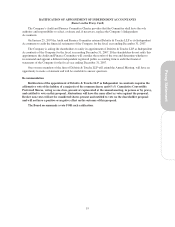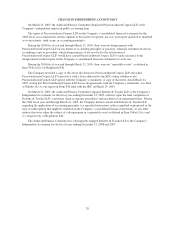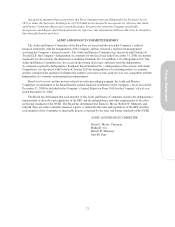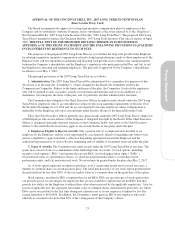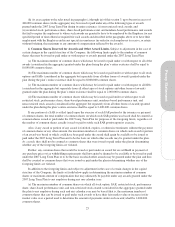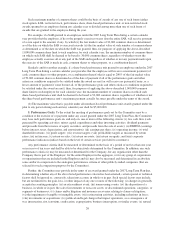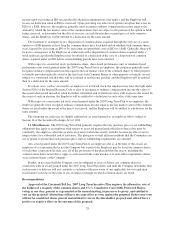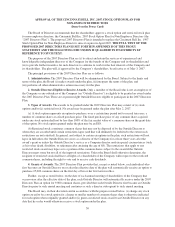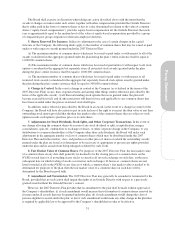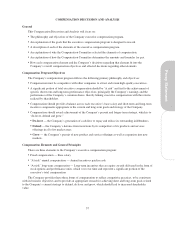Cincinnati Bell 2006 Annual Report Download - page 40
Download and view the complete annual report
Please find page 40 of the 2006 Cincinnati Bell annual report below. You can navigate through the pages in the report by either clicking on the pages listed below, or by using the keyword search tool below to find specific information within the annual report.income upon exercising an ISO (except that the alternative minimum tax may apply), and the Employer will
receive no deduction when an ISO is exercised. Upon exercising any other stock option (an option that is not an
ISO) or a SAR, however, the employee generally must recognize ordinary compensation income equal to the
amount by which the fair market value of the common shares that are subject to the portion of the option or SAR
being exercised, as determined on the date of exercise, exceeds the purchase or grant price of such common
shares, and the Employer will be entitled to a deduction for the same amount.
The treatment to an employee of a disposition of common shares acquired through the exercise of a stock
option or a SAR depends on how long the common shares have been held and on whether such common shares
were acquired by exercising an ISO or by exercising an option that is not an ISO or a SAR. Generally, there will
be no tax consequence to the Employer in connection with a disposition of common shares acquired under a
stock option except that the Employer may be entitled to a deduction in the case of a disposition of common
shares acquired under an ISO before certain holding periods have been satisfied.
With respect to a restricted stock, performance share, share-based performance unit, or nonshare-based
performance unit award granted under the 2007 Long Term Plan to an employee, the employee generally must
recognize ordinary compensation income equal to the fair market value of the common shares or other property
or benefits provided under the award at the first time such Common Shares or other property or benefits are not
subject to a substantial risk that they will be forfeited or not become payable; and the Employer will be entitled
then to a deduction for the same amount.
In certain cases, such as an award to an employee of restricted stock, the employee may have the right under
Section 83(b) of the Internal Revenue Code to elect to recognize as ordinary compensation income the value of
the award when issued instead of when no further substantial risk of forfeiture exists with respect to the award. In
the event of such an election, the Employer will be entitled to a deduction for such value at the same time.
With respect to a non-restricted stock award granted under the 2007 Long Term Plan to an employee, the
employee generally must recognize ordinary compensation income equal to the fair market value of the common
shares received under the award at the time it is received; and the Employer will be entitled to a deduction for the
same amount.
The foregoing tax rules may be slightly adjusted for an award granted to an employee who is subject to
Section 16 of the Securities Exchange Act of 1934.
11. Miscellaneous. The 2007 Long Term Plan generally requires that any purchase price or tax withholding
obligations that apply to an employee with respect to an award granted under the plan to him or her must be
satisfied by the employee when the award is exercised or when the award’s benefits become payable or are no
longer subject to a substantial risk of forfeiture. The plan gives several different methods that the Committee can
use or permit to ensure that such purchase price and tax withholding requirements are satisfied.
Any award granted under the 2007 Long Term Plan to an employee who is, at the time of the award, an
employee of a corporation that is not the Company but is part of the Employer may be based on common shares
of such other corporation. In such case, all of the provisions of the plan and this discussion, including the
common share limits noted above, apply to such award in the same manner as if such other corporation’s shares
were common shares of the Company.
Further, in no event shall the Company ever be obligated to issue or deliver any common shares in
connection with an award granted under the 2007 Long Term Plan unless and until the Company determines that
such issuance or delivery will not constitute a violation of the provisions of any applicable law (or regulation
issued under such law) or the rules of any securities exchange on which common shares are listed.
Recommendation
Approval of the Cincinnati Bell Inc. 2007 Long Term Incentive Plan requires the affirmative vote of
the holders of a majority of the common shares and 6
3
⁄
4
% Cumulative Convertible Preferred Shares,
voting as one class, present or represented at the annual meeting, in person or by proxy, and entitled to
vote on this proposal. Abstentions will have the same effect as votes against the proposal. Broker non-votes
will not be considered shares present and entitled to vote on the shareholder proposal and will not have a
positive or negative effect on the outcome of this proposal.
28



